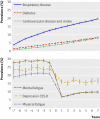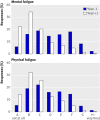Effect of retirement on major chronic conditions and fatigue: French GAZEL occupational cohort study
- PMID: 21098617
- PMCID: PMC2990862
- DOI: 10.1136/bmj.c6149
Effect of retirement on major chronic conditions and fatigue: French GAZEL occupational cohort study
Abstract
Objectives: To determine, using longitudinal analyses, if retirement is followed by a change in the risk of incident chronic diseases, depressive symptoms, and fatigue. Design Prospective study with repeat measures from 7 years before to 7 years after retirement.
Setting: Large French occupational cohort (the GAZEL study), 1989-2007. Participants 11 246 men and 2858 women.
Main outcome measures: Respiratory disease, diabetes, coronary heart disease and stroke, mental fatigue, and physical fatigue, measured annually by self report over the 15 year observation period; depressive symptoms measured at four time points.
Results: The average number of repeat measurements per participant was 12.1. Repeated measures logistic regression with generalised estimating equations showed that the cumulative prevalence of self reported respiratory disease, diabetes, and coronary heart disease and stroke increased with age, with no break in the trend around retirement. In contrast, retirement was associated with a substantial decrease in the prevalence of both mental fatigue (odds ratio for fatigue one year after versus one year before retirement 0.19, 95% confidence interval 0.18 to 0.21) and physical fatigue (0.27, 0.26 to 0.30). A major decrease was also observed in depressive symptoms (0.60, 0.53 to 0.67). The decrease in fatigue around retirement was more pronounced among people with a chronic disease before retirement.
Conclusions: Longitudinal modelling of repeat data showed that retirement did not change the risk of major chronic diseases but was associated with a substantial reduction in mental and physical fatigue and depressive symptoms, particularly among people with chronic diseases.
Conflict of interest statement
Competing interests: All authors have completed the Unified Competing Interest form at
Figures



Comment in
-
Is early retirement good for your health?BMJ. 2010 Nov 23;341:c6089. doi: 10.1136/bmj.c6089. BMJ. 2010. PMID: 21098616 No abstract available.
Similar articles
-
Effect of retirement on alcohol consumption: longitudinal evidence from the French Gazel cohort study.PLoS One. 2011;6(10):e26531. doi: 10.1371/journal.pone.0026531. Epub 2011 Oct 20. PLoS One. 2011. PMID: 22028898 Free PMC article.
-
Effect of retirement on sleep disturbances: the GAZEL prospective cohort study.Sleep. 2009 Nov;32(11):1459-66. doi: 10.1093/sleep/32.11.1459. Sleep. 2009. PMID: 19928385 Free PMC article.
-
Longitudinal study of associations between perceived health status and self reported diseases in the French Gazel cohort.J Epidemiol Community Health. 2001 Apr;55(4):233-8. doi: 10.1136/jech.55.4.233. J Epidemiol Community Health. 2001. PMID: 11238577 Free PMC article.
-
Mid-life occupational grade and quality of life following retirement: a 16-year follow-up of the French GAZEL study.Aging Ment Health. 2015 Jul;19(7):634-46. doi: 10.1080/13607863.2014.955458. Epub 2014 Sep 15. Aging Ment Health. 2015. PMID: 25220504 Free PMC article.
-
Socio-economic predictors of depressive symptoms around old age retirement in Swedish women and men.Aging Ment Health. 2019 May;23(5):558-565. doi: 10.1080/13607863.2018.1430741. Epub 2018 Jan 25. Aging Ment Health. 2019. PMID: 29368946
Cited by
-
Change in physical activity and weight in relation to retirement: the French GAZEL Cohort Study.BMJ Open. 2012 Feb 8;2(1):e000522. doi: 10.1136/bmjopen-2011-000522. Print 2012. BMJ Open. 2012. PMID: 22318663 Free PMC article.
-
What Factors Affect the Evolution of the Wife's Mental Health After the Husband's Retirement? Evidence From a Population-Based Nationwide Survey in Japan.J Epidemiol. 2021 May 5;31(5):308-314. doi: 10.2188/jea.JE20200071. Epub 2020 May 23. J Epidemiol. 2021. PMID: 32448823 Free PMC article.
-
Psychological Distress During the Retirement Transition and the Role of Psychosocial Working Conditions and Social Living Environment.J Gerontol B Psychol Sci Soc Sci. 2022 Jan 12;77(1):135-148. doi: 10.1093/geronb/gbab054. J Gerontol B Psychol Sci Soc Sci. 2022. PMID: 34396418 Free PMC article.
-
An Evaluation of the Policy Context on Psychosocial Risks and Mental Health in the Workplace in the European Union: Achievements, Challenges, and the Future.Biomed Res Int. 2015;2015:213089. doi: 10.1155/2015/213089. Epub 2015 Oct 18. Biomed Res Int. 2015. PMID: 26557655 Free PMC article. Review.
-
Paid employment and common mental disorders in 50-64-year olds: analysis of three cross-sectional nationally representative survey samples in 1993, 2000 and 2007.Epidemiol Psychiatr Sci. 2019 Feb;28(1):88-99. doi: 10.1017/S2045796017000403. Epub 2017 Aug 24. Epidemiol Psychiatr Sci. 2019. PMID: 28835299 Free PMC article.
References
-
- Doyle Y, McKee M, Rechel B, Grundy E. Meeting the challenge of population ageing. BMJ 2009;339:b3926. - PubMed
-
- Mojon-Azzi S, Sousa-Poza A, Widmer R. The effect of retirement on health: a panel analysis using data from the Swiss Household Panel. Swiss Med Wkly 2007;137:581-5. - PubMed
-
- Drentea P. Retirement and mental health. J Aging Health 2002;14:167-94. - PubMed
-
- Gall TL, Evans DR, Howard J. The retirement adjustment process: changes in the well-being of male retirees across time. J Gerontol B Psychol Sci Soc Sci 1997;52:110-7. - PubMed
Publication types
MeSH terms
Grants and funding
LinkOut - more resources
Full Text Sources
Medical
